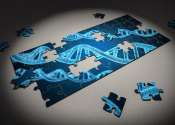Largest genetic atlas for zebrafish 'breakthrough' for biomedical research
Medical and life science researchers will benefit from the most comprehensive atlas yet of genetic data on zebrafish, newly published research suggests.

Medical and life science researchers will benefit from the most comprehensive atlas yet of genetic data on zebrafish, newly published research suggests.
Biotechnology
Jul 4, 2022
0
399

Advances in synthetic biology and genome editing have led to a growing industry to develop customized cell lines for medical research. These engineered cell lines, however, can be vulnerable to misidentification, cross-contamination ...
Biotechnology
Jun 6, 2022
0
323

A team of international researchers has discovered a way to produce higher quality wheat. The scientists from the University of Adelaide and the UK's John Innes Centre have identified a genetic driver that improves yield ...
Biotechnology
May 11, 2022
1
372

Ancient moa DNA has provided insights into how species react to climate change, a University of Otago study has found.
Plants & Animals
May 10, 2022
0
173

A team led by current and former Carnegie plant biologists has undertaken the largest ever functional genomic study of a photosynthetic organism. Their work, published in Nature Genetics, could inform strategies for improving ...
Plants & Animals
May 9, 2022
0
39

The discovery of pottery from the ancient Lapita culture by researchers at The Australian National University (ANU) has shed new light on how Papua New Guinea (PNG) served as a launching pad for the colonization of the Pacific—one ...
Archaeology
Apr 22, 2022
0
441

Oak Ridge National Laboratory scientists had a problem mapping the genomes of bacteria to better understand the origins of their physical traits and improve their function for bioenergy production. The method they had successfully ...
Cell & Microbiology
Apr 6, 2022
0
93

One of the ultimate goals of medical science is to develop personalized disease diagnostics and therapeutics. With a patient's genetic information, doctors could tailor treatments to individuals, leading to safer and more ...
Cell & Microbiology
Mar 22, 2022
0
13

Utilizing an innovative experimental model incorporating 240,000 strains of brewer's yeast descended from two common "parents," USC and Stanford University researchers published a new study providing insight into the genetic ...
Molecular & Computational biology
Mar 18, 2022
0
43

Salk Institute researchers have developed a new genomic technology to simultaneously analyze the DNA, RNA and chromatin—a combination of DNA and protein—from a single cell. The method, which took five years to develop, ...
Cell & Microbiology
Mar 9, 2022
0
46